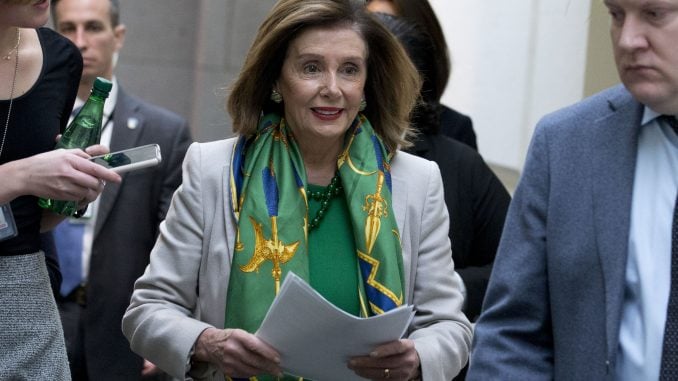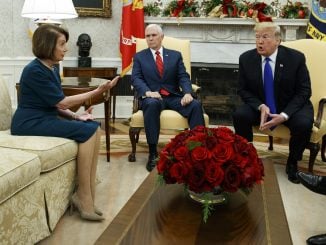
WASHINGTON, D.C. — Speaker Nancy Pelosi said Tuesday that the U.S. House will vote on Wednesday to send two articles of impeachment to the Senate. In a statement, Pelosi said the House vote will also include the naming of House impeachment managers.
Following Pelosi’s announcement, Senate Majority Leader Mitch McConnell (R-Ky.) said the Senate trial could begin as soon as next Tuesday. At a press event Tuesday, McConnell said that if the House votes to send the articles and names the managers, then his chamber will be able to start the trial process.
McConnell’s recent statements indicate that the Senate will operate according to many of procedural precedents set in the 1998 impeachment trial of President Bill Clinton.
There’s every chance that the impeachment trial of Donald Trump will look much like Clinton’s did 21 years ago.
There’s little chance the Senate will take the same path to get there. The third impeachment trial of a president in U.S. history is expected to start this week.
It’s a different Senate now, with the transformation of the parties over the past 20 years leaving fewer moderates to seek consensus. The hyper-polarization has led to steps deemed unthinkable in Clinton’s time, like the end of the filibuster for Supreme Court nominees, a sentiment that has now migrated to one of the Senate’s gravest constitutional responsibilities.
“In my view, I think what’s happening is that politics has taken over,” said Sen. Pat Roberts (R-Kan.) whose 24-year Senate career is coming to a close this year.
“That’s not unusual to say the least, but it’s just gotten to the point now that the blanket of comity that we always had over the Senate is, you know, getting pretty shredded.”
Twenty-one years ago, then-Senate leaders Trent Lott (R-Miss.) and Tom Daschle (D-S.D.) were able to start Clinton’s trial on a 100-0 vote. A decision on testimony, which created a partisan split, came later.
“I was determined from the get-go — I was not going to let the Senate lose all its decorum,” Lott recalled. “I wanted us to get through it in a respectable way so we could go back to work.”
McConnell has invoked the precedent of the Clinton trial resolution to unite his party. His resolution is expected to lay out a schedule for opening arguments and questions, but push off until later a decision on calling witnesses — as senators did in Clinton’s trial.
“If that unanimous bipartisan precedent was good enough for President Clinton, it should be our template for President Trump,” McConnell said. “Fair is fair.”
Three Republican Senators — Susan Collins (R-Maine), Mitt Romney (R-Utah) and Lisa Murkowski (R-Alaska) — have expressed interest in hearing from witnesses but all have supported a vote on witnesses after the trial begins.
“As I’ve said from the very beginning, I have always believed that the model we used with the Clinton trial 20 years ago worked very well,” Collins said Monday.
Democrats, led by Sen. Chuck Schumer of New York, say allowing testimony is the only way to have a fair trial.
“When Leader McConnell talks about precedent, he’s talking about witnesses,” Schumer said. “Plain and simple.”
The wrangling over Senate procedure is just a sampling of how the political past has been exhumed, vote by vote and statement by statement, as the parties have fought through Trump’s impeachment on charges of abuse of office and obstruction of Congress.
Both McConnell and Schumer were in the Senate for the Clinton trial and fought on opposite sides when it came to testimony.
Twenty-one years ago, as a newly-sworn senator, Schumer was adamant against calling witnesses like Monica Lewinsky. “This is not a fishing expedition to be conducted on the floor of the Senate,” he said.
Schumer also voted in 1999 for the unanimously approved resolution that got the Clinton trial started.
The script is similarly flipped for McConnell, who was an advocate for hearing from witnesses like Lewinsky, the White House intern with whom Clinton had an extramarital affair.
“It’s not unusual to have a witness in a trial. It’s certainly not unusual to have a witness in an impeachment trial,” McConnell said on CNN’s “Larry King Live” in January of 1999. “The House managers have only asked for three witnesses. I think that’s pretty modest.”
Now McConnell’s not so sure, saying it’s not the Senate’s job to bolster a House impeachment case he considers “slapdash.”
Yet there are clear differences between the Clinton experience and the Democrats’ case against Trump. Independent counsel Kenneth Starr compiled the case for Clinton’s impeachment, handing Congress boxes of sworn testimony and evidence.
Trump’s actions toward Ukraine, by contrast, have not been investigated outside the political process. The White House ordered witnesses not to appear before the House and refused to turn over documents, leading Democrats to approve an article of impeachment against Trump for obstruction of Congress.
North State Journal staff contributed to this report.



